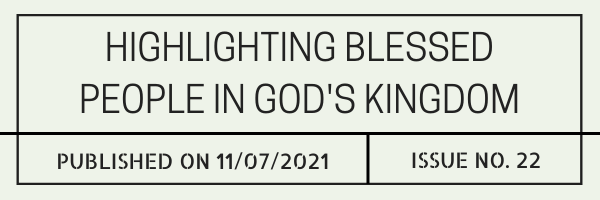
“When Is Our Mercy Rewarded?“
[By Robert Haynes]
“Blessed are the merciful, for they will be shown mercy” – Matthew 5:7 (NET Bible)
Among the Beatitudes, this one is straightforward. A Christian should be one especially aware of this rejoicing in the mercy that God shows us every day. The application can be challenging, though, for a couple of reasons. One is because we can choose to show partiality in our mercy and miss understanding the meaning of God’s own mercy. The other is because we may come to expect an immediate recompense and happiness, which feeds back into who and how we show mercy. In this short moment, let’s consider God’s mercy and when the merciful receive their reward.
Matthew 18:23-35 is a parable of a king settling accounts and the debts of his slave, which Jesus gave in response to Peter’s question about how often he should forgive his brother. One brought to him has no way of possibly repaying it, yet is forgiven. That slave goes to collect the debts of one of his fellow slaves with a lower debt, but won’t waive the debt. That king hearing the injustice throws that unforgiving slave into prison for his lack of mercy. It’s an extreme example, but it’s to demonstrate that there shouldn’t be a limit to the forgiveness or mercy that one brother shows to another. What’s more, the mercy we are to show one another pales in comparison to God, our King’s, mercy shown to us.
When Jesus sent out his apostles in Matthew 10:8, he instructed them to “Heal the sick, raise the dead, cleanse lepers, cast out demons. Freely you received, freely give” (NET Bible). For Jesus gave them the authority to do such things without any kind of payment, so they were to do. I think there’s a certain weight that can be forgotten in the mercy shown when the gospel is taught to you, especially when you’ve grown up with it all your life. It did not cost us to hear the gospel, except perhaps for some emotional pain upon realizing our state of sin before our joyful transformation. Jesus has paid it all, and shown us grace freely bestowed (Eph. 1:6). Whether in the context of forgiveness or giving the gospel, we must do it freely without consideration for the scope, and to be merciful on such a scale is daunting.
Like God, our Father, we must be merciful as He is merciful (Luke 6:36), and that includes showing mercy knowing that it might not be appreciated or paid back. Jesus instructed his apostles not to take anything in Matthew 10 as he sent them out, and that they may also not be well received. So, is this Beatitude not true? Perhaps we come to expect mercy shown to us for mercy we’ve shown to another, but are denied it. We hinder our spiritual progress and growth in using mercy in the sense of exchanging favors or when we expect reward. It’s in demonstrating God’s goodness and mercy to those who cannot possibly repay, or even persecute you for it, that causes people to think that there might be something better out there. Even then, the result is only dimly seen in this world. “When you host an elaborate meal, invite the poor, the crippled, the lame, and the blind. Then you will be blessed, because they cannot repay you, for you will be repaid at the resurrection of the righteous” (Luke 14:13-14, NET Bible). The fruits and the happiness of the merciful will not completely be seen until the final day; we may not see it in our lifetime, unless Jesus comes again quickly.
We’re challenged to forgive the debt of others whether literal or figuratively healing the grief and pain of others. We’re challenged to be merciful to those who cannot repay, no matter how large or small the inconvenience on us. We’re challenged to be merciful knowing we may not receive the blessings of mercy until well beyond our lifetime. We show mercy and forgiveness to those outside the faith as well in the hopes that we show a light to one in darkness, misery, and pain and knowing that God in his love and mercy forgave us though we were good as dead (Eph. 2:4-7). Along the way, we may find that we’ve created the community of forgiving and forgiven people of God’s Kingdom, which demonstrates God’s own grace and goodness (Eph. 2:8, Micah 6:8). Only a forgiving and forgiven people can know the joy of being freed from the debt of sin. A joy finally known when we give account and enter into the joy of our Lord for having done well. So, let us “speak and act as those who will be judged by a law that gives freedom. For judgment is merciless for the one who has shown no mercy. But mercy triumphs over judgment” (James 2:12-13, NET Bible).
